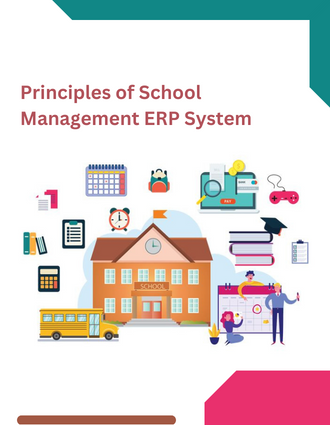School management ERP system is an essential element of successful education. It ensures that the school operates effectively and efficiently. An enterprise resource planning system can help schools manage their resources and processes better.
It’s a comprehensive software solution designed to integrate all aspects of a school’s operations, from student information to financial management. In today’s world of ever-increasing competition, schools need to stay ahead of the game. One way they can do this is by implementing a student management system. An ERP system is designed to make school operations and management more efficient, cost-effective, and accurate.
It helps streamline administrative and operational activities like budgeting, finance, reporting, student data management, and more. In this blog post, we will discuss the core principles of management software for schools and how it can help your school become more organized and efficient.
Core Principles of a School Management ERP System
ERP school management solution is a powerful tool for educational institutions, allowing them to track and manage their data more efficiently and effectively. It can provide significant relief from doing tasks manually while guaranteeing accurate results.

By taking advantage of the various principles behind an ERP system, schools can easily improve their administrative processes and streamline their workflow. Read on to take a look at the main principles of the school management ERP software and understand how these principles can help schools to better manage their operations.
Single Centralized Database
An ERP system for schools is a comprehensive solution that provides an integrated suite of tools and applications to manage school processes. The system is based on the principle of a single centralized database that contains all the data related to the school.
This data is accessed, managed, updated, and shared with stakeholders of the school through a web-based interface. With this online school management software, schools can gain access to important information such as student records, teacher records, financial records, and other school activities in real-time.
This also ditches the need for manual paperwork or data entry into multiple software programs. All the data is stored in one place, making it easier to access and analyze. The single centralized database of the school management software also allows for better communication between different departments of the school.
Information such as student grades, class schedules, or even staff absences can be easily communicated between departments without having to switch from one software program to another. This increases efficiency and reduces the amount of time spent on data entry.
A single centralized database also simplifies decision-making processes by allowing administrators to view all the information related to the school in one place. This helps administrators make more informed decisions and ensures that everyone in the school has access to the same information.
Overall, a single centralized database is a key principle of the school management ERP software and enables schools to manage their day-to-day operations more efficiently and accurately.
Flexibility to Fit Your Needs
Every school has different needs and requirements. An effective school management ERP system should be flexible enough to meet these needs. It should allow schools to tailor the system to fit their specific requirements and maximize its use in their day-to-day operations.
The school ERP software should have an intuitive user interface that enables teachers, staff, and administrators to easily navigate the system and access the information they need without too much hassle. It should also have customizable features that allow users to customize the look and feel of the system so that it fits their unique needs.
In addition, the system should be easy to install and manage, with minimal disruption to existing operations. The software should be able to be deployed in a short period of time, with little or no downtime.
Finally, the system should be highly secure, with the ability to protect data against external threats. Overall, having a flexible school management ERP software will ensure that it meets the specific needs of each individual school and provides a powerful tool for managing all aspects of school operations.
Error Handling
Error handling is an important principle of any ERP system. Errors can cause a lot of frustration and inefficiency. They can even prevent the system from functioning properly. It is, therefore, essential that any ERP system for school management has robust error-handling capabilities.
The management system for schools must be able to detect errors as soon as they occur and take corrective action in order to ensure the smooth running of the system. This can be done through automated processes, such as error logging and reporting, as well as manual processes, such as user input verification. Error handling should also include procedures for recovering data in the event of a crash or other system failure.
Error handling is also important when it comes to troubleshooting and resolving issues. The system should provide an easy way to identify and isolate errors and then make corrections to fix the issue. This can be done through online help guides, detailed documentation, and/or access to a customer support team who can assist in resolving any issues that arise.
In addition to error handling, another key principle of the best student management software is data integrity. Data integrity ensures that all data stored in the system is consistent, accurate, and up-to-date. It also ensures that the data is secure from unauthorized access or manipulation. Ensuring data integrity is essential for maintaining a reliable and secure system.
Overall, error handling is an important principle of student management ERP and one that should not be overlooked. Without effective error-handling capabilities, the system may be unreliable and insecure, leading to loss of data, reduced efficiency, and user frustration.
Scalability
Scalability is a key principle of ERP software for school management. The system must be able to grow with your school as it changes over time. It should be able to accommodate additional users and data without slowing down and also allow for multiple levels of access for different users.
The school management software must also be able to manage complex operations that are often specific to educational institutions, such as student records, attendance tracking, and tuition management.
These processes are intricate and require extensive data tracking in order to manage them effectively. Therefore, the system must be capable of handling large amounts of data while remaining efficient.
An important part of scalability has an efficient data storage system. This includes the ability to easily store, search, and retrieve information quickly. The system should also have the capability to scale up or down as needed in order to handle changes in user numbers or workloads.
Finally, it’s important that the school management ERP software has the ability to integrate with other applications and systems that are used within the school. This ensures that any new changes made in one part of the system will be reflected in all related areas. This helps make sure that the system is cohesive and can effectively handle more complex processes.
Overall, scalability is essential for any management system for a school in order for it to be effective and reliable. It ensures that the system can keep up with changing needs and remain flexible enough to grow with the school over time.
Wrapping Up
It is essential to build a robust and reliable ERP system that is based on solid principles of working. This ensures the smooth working of the software and evidently helps schools level up their productivity.
Understanding these core principles of the ERP school management software can also assist in the seamless implementation of the software. Proctur offers dedicated school management software that can cater to the diverse needs of a school.



